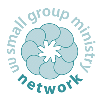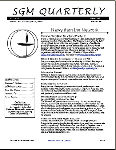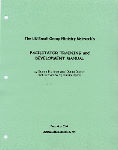First Universalist Church of Minneapolis, a church of approximately 850 adult members, recently started a small group ministry program after a long break.
Years ago we started Sharing Circles, what we called our small groups at the time. The groups were lay led and content was created by Rev. Kate Tucker (Associate Minister) in collaboration with the facilitators. After 4 years, Sharing Circles had dwindled, but there was still hunger for small group ministry that would help connect individuals in our large church. Challenges to the program were lack of men's involvement, no staff support in administering the program, and too-complex session plans.
It had always been a dream of the church to have a vibrant Small Group Ministry program that would connect people across age, gender, and affinity, but we didn't know where to start.
In a wise move, we decided to take things slowly. Our first step was to go to The Mountain for the Small Group Ministry Conference in the summer of 2008. An active lay leader, Jeff Sylvestre, board member Candace McClenahan, and associate minister Kate Tucker accompanied me. There, we began to dream big. We learned about administration, content, process, facilitator training, engaging in service, etc.
When we returned, we gathered together numerous lay people who we thought would make great facilitators or process observers and gathered together in a group that met to engage in small group ministry sessions and to dream about how we might bring this ministry to the larger congregation. We settled on the name ARC groups. ARC stood for Action, Reflection, Connection, our three primary goals of the groups. Next we piloted two groups that met for eight sessions, to see how our ideas might work in real time. The pilot groups pointed out some challenges in our original design. As we evaluated the pilot process and welcomed our newly called senior minister, Justin Schroeder, we made more changes.
We changed the name from ARC to Sermon-Based Small Groups. One of our congregational goals is to become more transparent to newcomers. We felt that it wasn't readily apparent what ARC was. Also, we thought that newcomers might not understand the aim of the group, or think that they shared anything in common with the other members and wouldn't sign up. By shaping content around the worship themes, and specifically Sunday morning sermons, we could give any member of our congregation the capacity to stand on equal ground to participate in reflection, discussion, and deep listening. Sermons are available during the service, of course, but also immediately available on CD in the church office and they're pod-casted on the church website within the week, so that all can listen before their groups meet. Listening to the sermons is part of the covenant that participants agree to in their groups.
Content for the sessions is still being developed by Rev. Kate Tucker. She has been choosing questions that get at the heart of the sermon's message. We have found it essential to group process to limit our reflection questions to one or two, and the readings that we use are typically the readings used in the sermon that we're focusing on. Thus far, we have been pleased with this content. It allows us all to go deeper into the sermons, rather than just letting them wander in one ear and out the other.
Right now, during the fall semester, we have seven active groups, with between eight and ten participants in each group. All of our facilitators are trained. We were delighted with the Facilitator's Training Manual developed by the UUSGM network, and easily adapted it to our use. In two of our groups, we paired newcomers to the process with more seasoned facilitators to co-facilitate. This gives our leaders a chance to mentor individuals who have been recognized as possessing the qualities essential to good facilitation.
The groups will break up in December, 2009. We hope to form twelve to fourteen groups in January to offer this experience to more of our congregants. At that time, we'll integrate service opportunities into the groups. The most important thing to recognize is that we are constantly evaluating what we're doing, and how we might change it to make it better for participants and facilitators and help all congregants connect, engage, and be transformed.










 HEART TO HEART: Fourteen Gatherings for Reflection and Sharing, April 2009
HEART TO HEART: Fourteen Gatherings for Reflection and Sharing, April 2009